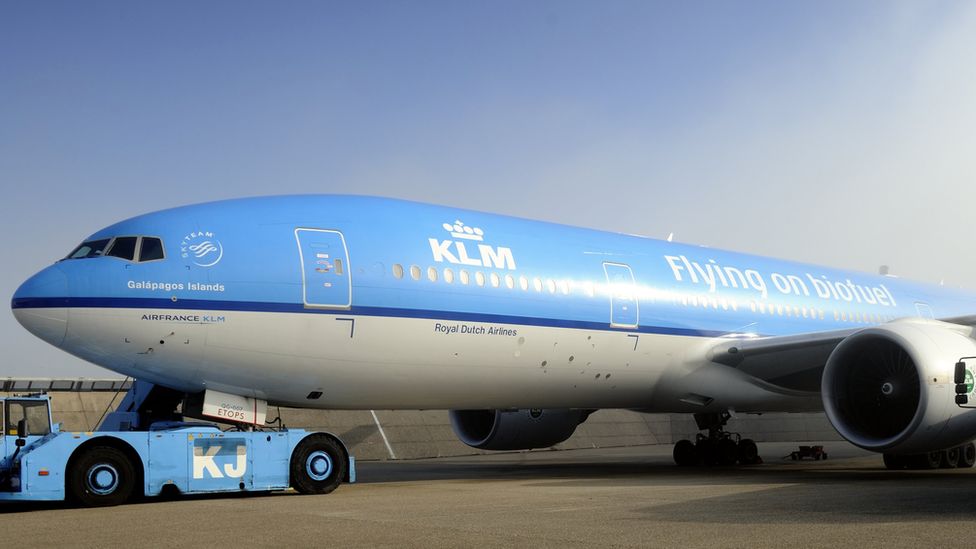Environmentalists sue Dutch airline KLM for 'greenwashing'
- Published

Environmental groups are suing Dutch airline KLM, alleging that adverts promoting the company's sustainability initiative are misleading.
The groups say it's the first lawsuit to challenge so-called airline industry "greenwashing".
They argue that KLM adverts and their carbon-offsetting scheme create the false impression that its flights won't make climate change worse.
But KLM says the company's statements are "based on solid arguments", and that it believes its adverts "comply with the applicable legislation and regulations".
Netherlands-based group Fossielvrij NL - supported by ClientEarth and Reclame Fossielvrij - is taking aim at the company's Fly Responsibly campaign, which was launched in 2019.
The campaign declared the airline is "creating a more sustainable future" and is on track to reduce its greenhouse gas emissions to net zero by 2050.
It features a carbon offset product called CO2Zero, which KLM says funds reforestation projects or the company's purchase of biofuels. Carbon offsets balance out greenhouse gas emissions from polluting activities.
But the groups argue the claims are highly misleading. They say the airline's plan to return to pre-pandemic levels of flights is at odds with the latest report by the UN climate body - the Intergovernmental Panel on Climate Change - which calls for a rapid reduction in greenhouse gas emissions.
The environmental groups call the advertising campaign "greenwashing" - in other words, a misleading attempt to make the company seem environmentally friendly.
They claim products like CO2Zero do nothing to limit damage to the environment, and that by promoting it to customers, the Dutch airline is undermining action to minimise climate change. They're bringing the lawsuit under the EU's Unfair Consumer Practices Directive.
KLM says it had discussions with the environmental groups to see if there was any room for a solution other than a court case, but that it "proved impossible".
"We critically assess all our communications about sustainability, and welcome input from all our stakeholders," KLM spokesperson Marjan Rozemeijer told the BBC. "We hope that a court ruling in this case will clarify how best to shape our communications policy."
If the case in Amsterdam is successful, KLM will have to withdraw the advertising, stop any similar advertising in the future and issue corrections.
Hiske Arts, a Fossielvrij campaigner, said: "Flight emissions cannot be 'compensated' if customers just pay extra to plant trees or give money towards the cost of false solutions like what the industry calls 'sustainable aviation fuels'. With these messages, KLM continues to throw sand in our eyes.
"We're going to court to demand KLM tells the truth about its fossil-fuel dependent product. Unchecked flying is one of the fastest ways to heat up the planet. Customers need to be informed and protected from claims that suggest it is not."
But KLM says its Fly Responsibly initiative focuses on "flying being a conscious choice", urging people to "think twice before boarding an aircraft".
Some argue that in sectors like air travel, where there aren't any realistic "green" alternatives, carbon offsetting can play a role in mitigating the effects of climate change. But climate scientists point out that for offsetting to work, the planted trees must be maintained over their lifespan - and this is difficult to guarantee.
Joana Setzer, assistant professor of climate law at the London School of Economics, says companies are in a difficult position.
"They're forced to show they're doing something and announce commitments, but it's not only insufficient but dangerous for them to do so, as they might find themselves sued for misleading information," Prof Setzer says.
"With greenwashing, it's a relatively easy and cheap case to bring, but it's also a case where you can address the advertising as well as the communications around net-zero commitments."
KLM says it's committed to communicating "transparently and honestly" about the company's approach to sustainability, and that it would not be in its interest "to misinform customers".
Advertising regulators have recently cracked down on misleading marketing. In April, the Dutch advertising watchdog ruled that KLM adverts telling customers they could fly carbon-emission free were misleading.
In September 2019, the UK's Advertising Standards Authority found that a Ryanair campaign urging customers to fly with "Europe's Lowest Fares, Lowest Emissions Airline" was misleading. It ruled that the offending adverts should not appear again in their current forms.
This case could have broader ramifications according to Prof Setzer, who says: "One case brought and won in a country has a cascade effect. Airlines exist everywhere, consumer protection laws exist everywhere. These are easily transferable."